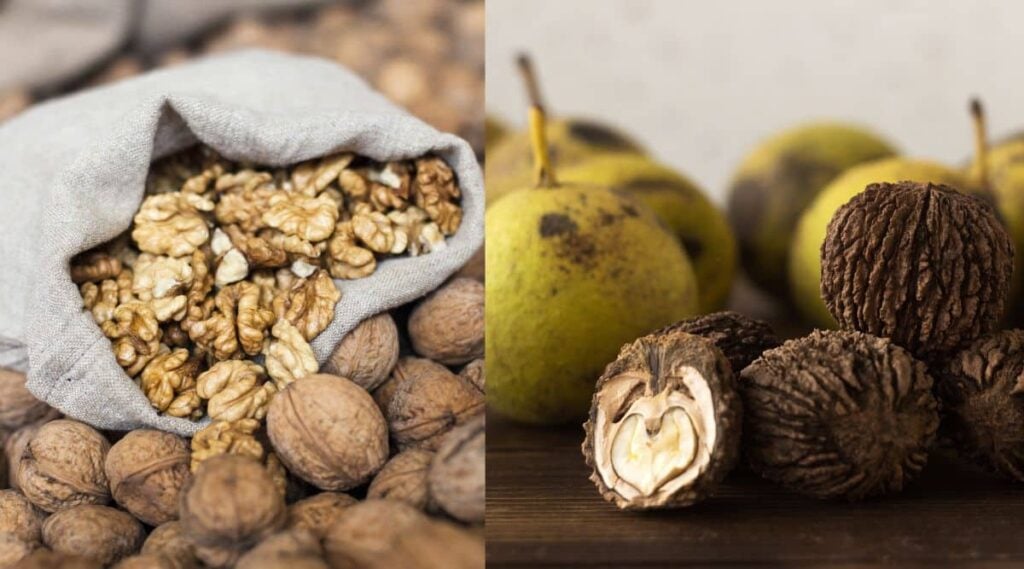Can Dogs Eat Walnuts? Are They Toxic For Dogs?
When you purchase through links on our site, we may earn a commission. Here’s how it works.
If walnuts are your go-to snack, you might wonder whether you can share them with your four-legged best friend. Or maybe you live in an area where walnuts are common, and you’re worried about Fido eating one off the ground. Whatever your reason for being here, we answer all the walnut wonders you have and more.
Table of Contents
Unfortunately, walnuts are off-limits for Fido. Despite being a fantastic source of antioxidants for us, almost half of the dogs that eat a few walnuts suffer from adverse effects such as vomiting and diarrhea. Plus, the walnuts found on the ground during fall are often covered in mold, which can cause seizures in dogs. So, you should avoid feeding your dog walnuts. There are much better snack options out there.
Let’s look at why dogs react badly to walnuts and more about the toxic mold found on them, especially fallen walnuts. We explore avoiding them when you’re out on walks and other nutty alternatives you can give your dog. Let’s take a closer look.
Can Dogs Eat Walnuts?

There are many types of walnut, but the English walnut (Juglans regia) and the black walnut (Juglans nigra) are the two most common. The English walnut is usually sold in stores worldwide as a snack for humans. Although dogs can technically eat a small amount of these walnuts without suffering significant adverse effects, they pose a choking hazard. Walnuts sold as a snack for humans are also commonly seasoned, which poses further issues for Fido.
The black walnut is a species native to North America. This walnut has a strong flavor but is not commercially cultivated in orchards because the shell is tough. Black walnuts are particularly toxic to dogs. Like pecans which are also harmful to dogs, they may contain a poisonous chemical called juglone. Although all walnut species produce juglone, the black walnut has the highest concentration. So much so that many plants within 80 feet of a mature black walnut tree often die or their growth is majorly stunted.
To be safe, your dog should not eat any walnut. Both types of walnut can pose a choking hazard, and both contain juglone and are susceptible to mold, which we examine next.
Toxic Mold
It isn’t just the walnut itself you must be concerned about. Walnuts are susceptible to mold. Like other tree nuts, exposure to moisture and high temperatures during storage and harvesting can cause mold to spread. The whole batch must be disposed of if one nut has mold, either on the kernel or shell. Toxic mold is commonly found on fallen walnuts too. Mold commonly found on walnuts is called Aspergillus flavus, and it produces aflatoxin, a natural poison toxic to dogs. The toxins can be present even if there is no visible mold.
What Happens If My Dog Eats Walnuts?

Ingesting juglone or mold can cause gastrointestinal problems such as stomach cramps, vomiting, and diarrhea. And because both English and black walnuts contain this chemical and are susceptible to mold, you should not give your dog either walnut. Your dog’s gastrointestinal problems might last a few hours. But for some, it can worsen and need medical treatment. Because you cannot be sure how your dog might react, seeking veterinary care is essential.
The result of your dog eating walnuts depends on a few factors, such as what type they have eaten, how much they have consumed, and if there was any mold present. Some people say that the size of the dog has an influence on the outcome, but it’s more complex than that. A Chihuahua might have eaten a little bit of walnut and be fine. At the same time, a large dog like a Newfoundland might find the exact amount and react adversely.
Symptoms Of Walnut Poisoning
If you suspect your dog has eaten a walnut, seek veterinary advice immediately. Do not wait for symptoms to develop because time is of the essence. There are several symptoms that your dog might develop after consuming walnuts:
- Panting and excess salivation
- Vomiting and diarrhea
- Restlessness
- Elevated body temperature
- Increased heart rate
- Weakness and incoordination
- Loss of appetite
- Dehydration
- Muscle tremors and seizures.
- Kidney and liver damage
- Death
If you see any of these symptoms, you must get your dog to the vet immediately. If your vet confirms poisoning, your dog will need to stay for observation. They might induce vomiting to remove any remaining walnuts and administer activated charcoal to absorb the toxins. IV fluids may be administered to help flush the toxins from the system, keep Fido hydrated, and protect their liver and kidneys. Medications or sedation might be needed to control seizures and other clinical signs.
Your dog’s recovery could take two to five days. Once you bring them home, you must monitor them for any of the above symptoms because they might go downhill again. They might still feel fatigued for a while, and they need plenty of rest. Keep them well hydrated too.
Walnut poisoning is one of the most common claims for toxic ingestion. You should also avoid walking Fido, where black walnut trees are common.
If you live in an area with many walnut trees, you should consider pet insurance for your pup. Pet insurance can alleviate financial pressures and huge veterinary bills, ensuring Fido gets all the medical help needed in an emergency.
Safe Nut Alternatives
Some nuts offer many health benefits, and Fido can enjoy some. Walnuts, pecans, almonds, and macadamia nuts are the nuts to avoid. But peanuts and cashews are generally safe to eat in moderation. They must be plain, deshelled, without any seasoning, and not mixed with other nuts or dried fruit. Peanuts are one of the most common snacks for humans, and the great news is you can share them with Fido.
Frequently Asked Questions
Here are some of the most frequently asked questions about whether dogs can eat walnuts.
Can Dogs Eat Walnut Shells?
No, dogs cannot eat any part of the walnut. The kernel and the shell can contain juglone and toxic mold, so your dog should not eat any piece of the walnut. The shells are particularly tough and also pose a choking risk.
Can Dogs Eat Chopped Walnuts?
No, dogs cannot eat chopped walnuts. However, chopped walnuts do not pose a risk in terms of choking. Remember that even if you cannot see any mold, the walnut might contain toxic mold, chopped or not. It’s best to give them a dog-safe snack instead.
Can Dogs Eat Walnut Cake?
No, dogs cannot eat walnut cake. If they find a piece of walnut cake on the floor, it probably isn’t going to harm them. But remember that cake is high in fat and full of sugar. A doggy diet high in fat can lead to weight gain, pancreatitis, and further health problems.
How Can I Avoid Walnuts On The Ground When Walking My Dog?
Unless you keep Fido on a tight leash without them sniffing around, you cannot 100% avoid walnuts on the ground. Walnut trees typically drop their seeds from September to October but can remain on the ground for months. And this is where they are more likely to develop mold. The best way to avoid them is to stay away from areas where you know there are walnut trees.
Final Thoughts
Now you know that dogs shouldn’t eat walnuts. Sure, they are not as toxic as other food like raisins. However, walnuts, especially black walnuts, contain juglone which is toxic to dogs. And walnuts are also highly susceptible to mold, which is deadly to dogs. Black walnuts on the ground are especially vulnerable to mold, and you should avoid walking your dog in areas where black walnut trees are during the fall. Overall, there are much safer snacks to give your beloved doggo.



